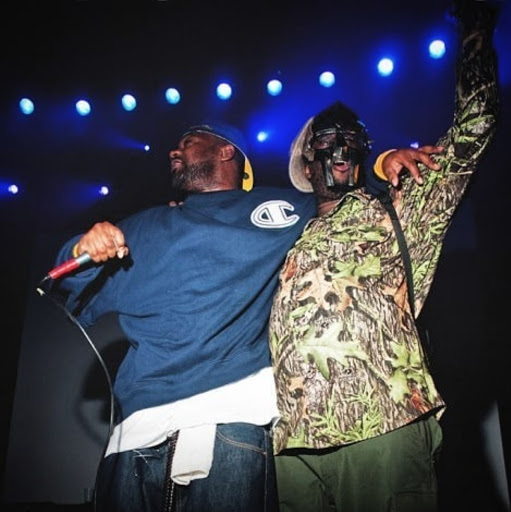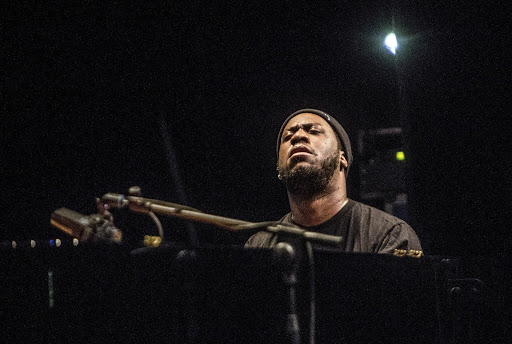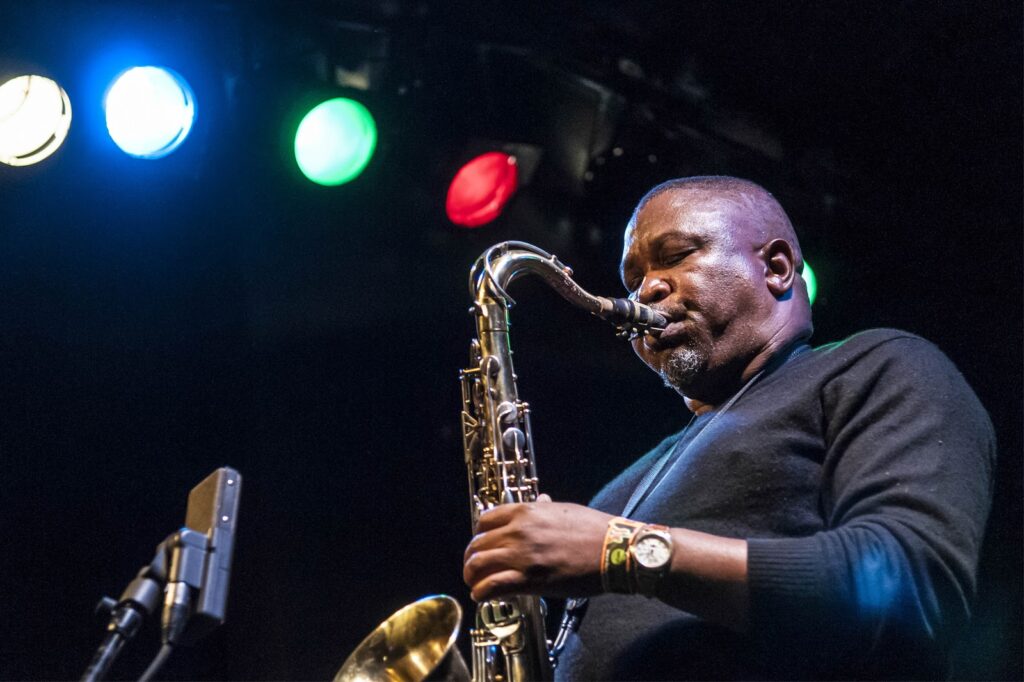MF DOOM with Robert Glasper at the Montreux Jazz Festival. They also performed at the Cape Town International Jazz Festival. (Photo: Robert Glasper/Facebook)
PART ONE
4 April 2013
It is Thursday afternoon and the press conferences for the various artists who will be performing at this year’s Cape Town International Jazz Festival are already in full swing. Some artists are still arriving at their temporary hotel residence for the duration of the festival. The hotel foyer is buzzing with activity when I arrive back from a lunch break.
As I steadily inch my way to the press conference venue, I notice a lone figure sitting by the bar. He is wearing what looks like a charcoal flat-cap, held firmly in place by a pair of matte-black earphones that match the frames of his spectacles. Initially, I don’t think anything of it, although by his posture he looks like he could be one of the musicians who are scheduled to perform.
I stop to take a good look, wondering if maybe I am seeing Robert Glasper, who I intend to interview the following day. I change my mind. He doesn’t look as if he is the same height as Glasper. In this brief moment one of the logistics people for the festival walks up to him and says something — I don’t hear exactly what, except the name “Daniel”.
Now I am curious. The logistics person walks back to her table so I decide to go after her and ask about the stranger. She says she doesn’t know him, save for the fact that he has just arrived from the airport and that his name is Daniel.
Okay then. I decide to satisfy my now burning curiosity and approach the man myself. I lightly tap him on the shoulder and ask, “Excuse me, sir, is your name Daniel — as in Daniel Dumile? I heard the lady call you by that name.” He turns to me with an interested smile on his face and asks, “What if I am, who told you that?” I tell him I was just guessing after hearing the name Daniel, which I also know belongs to one Daniel Dumile. Dumile is the special guest of Robert Glasper at this year’s jazz festival. He’s popularly known as MF DOOM, or the updated DOOM, in the hip-hop world.
He laughs and extends a warm hand of greeting, saying: “You’re the first one to spot me.” What he means by that is that I am the first person to spot him without his signature mask, which looks like that of Marvel Comic villain Victor von Doom’s, a feature that has made him an elusive and mythical hip-hop character over a long and illustrious career.
He tells me he has just arrived after a long flight, saying that the weather in Cape Town is “just lovely”. I ask where he was flying in from and he says London. “That’s probably why the weather in Cape Town is lovely,” I think to myself. Despite his weariness, he is very friendly and open. I ask the obvious question of whether a one-on-one interview would be possible.
“Sure, just speak to my manager over there — the dude in the blue cap. His name is Adrian,” he says. “Tell him I said you should speak and we’ll see if we can organise something.” I am beyond ecstatic and awkwardly nervous now.
That one of the most interesting rappers in the game should be performing alongside the Grammy award-winning Glasper should not come as a surprise. A quick search on YouTube will give you all the explanation and context that you need.
DOOM is essentially to hip-hop what Fernando Pessoa is to literature with his many interesting heteronyms. He too has many sides — alter-egos — and just as much creativity. His style of delivery, never mind his lyricism, is without parallel, at least as far as I am concerned. But for now, I will content myself with the hope that I will get a chance to speak to this legendary genius of hip-hop and look forward to seeing him doing his thing on the stage.
 DOOM pictured on stage with Ghostface, whom he collaborated with. (Ghostface, Instagram)
DOOM pictured on stage with Ghostface, whom he collaborated with. (Ghostface, Instagram)
PART TWO
8 April 2013
“Bad news: today is cancelled. Really sorry, but we just made the decision. He needs to rest, not feeling 100%. You should have enough material to produce an interview. If not, email the further questions. Once again, apologies.”
That was the text message I received from Adrian, Daniel Dumile’s manager, on that fateful Tuesday morning, two days after the Cape Town International Jazz Festival had come to a close and four days since my serendipitous encounter with the man behind the eccentric mask that is DOOM.
Adrian had informed me on Sunday, after yet another possible appointment fell through, that they would be leaving on Tuesday evening. All I really needed, I told myself, was 30 minutes. I had more than enough time to put together some good questions; I had taken counsel from fellow DOOM enthusiasts and thus was nothing if not prepared.
Feeling desperate that my last chance to interview Daniel Dumile was passing me by, I took matters into my own hands and decided to go and wait in the hotel foyer in the hopes of spotting Adrian. I figured that if he saw me in person he would have no choice but to tell me straight if I were getting the interview.
After a long pause, I saw Adrian and finally found myself in the company of Dumile once again. They had just returned from the recording studios and were a bit knackered. We were at the same place we had originally met the week before, the bar at the hotel foyer. But before we could even start, and to my immediate dismay, Dumile informed me that he did not want to do a formal interview and preferred to just have a conversation, assuring me that we could do the formalities later in the evening.
I should’ve known better, because “later in the evening” never did happen. The alternative Tuesday morning also didn’t happen. Regardless, and I say this with a recovering heavy heart, our brief conversation was an eye-opener, albeit a limited one.
The ‘interview’
I am not quite sure how it came about, but after inviting me to join him at the bar the question of marriage arose. I answered in the affirmative, careful not to overshare.
“God bless,” Dumile responded jovially. “That’s a beautiful thing man. Me myself, I been married for 12 years and we’ve known each other for a longer time than that. Our families are close so it was probably always going to happen, I guess. She used to be in the banking industry so naturally [laughs] she’s the one who handles all the finances, like when I worked on the Madvillainy album with Madlib — that was her.”
Dumile was surprisingly not guarded at all. His voice and mannerisms were the exact replica of the animated character that one hears in almost all of his albums. It was as if, at any moment, he could randomly start rhyming.
Well aware that we were just having a conversation, some questions nevertheless found their way in; looking back I’d say “fortunately”. Remembering that he is currently based in London, I asked if he found it more conducive for his work than the United States. “I am forced to live there at the moment, some citizenship-related thing about where I was born that I am trying to resolve. My family is still in the US,” he said.
For those who don’t know, Dumile is a United Kingdom-born citizen but grew up in the US from a young age after his parents relocated. His father is Zimbabwean and his mother British by birth.
I asked him when Robert Glasper came into the picture, noting how well Glasper and his band gave his music a refreshing feel of jazz.
 DOOM says Rober Glasper picked up on the jazz inflections in his style, hence their collaboration, which has seen them hit several international festivals. (Mario Cinquetti/NurPhoto/Afp)
DOOM says Rober Glasper picked up on the jazz inflections in his style, hence their collaboration, which has seen them hit several international festivals. (Mario Cinquetti/NurPhoto/Afp)
“Glasper is like all ambidextrous and shit. When I first saw him in the studio, his hands were doing all kinds of crazy shit like it weren’t a thing. He’s a giant, he’s got that magic and more importantly, he is comfortable in his magic. We worked together at the Montreux Jazz Festival, two iTunes concerts in the US and in London and this festival right here in Cape Town — so this is our fourth one if I am not mistaken.”
“Jazz … I love jazz. Usually when I get home I’ll put on some jazz station with my daughter and just let it play. I know way more about jazz than I do about anything else [even hip-hop]. I listen only to jazz … strictly,” he adds.
“I think that, that’s probably something that Robert [Glasper] picked up on and that’s why he wanted us to work together and for me to be a part of his experience.”
I had mentioned the late Zim Ngqawana while talking about some of South Africa’s great jazz musicians but it seems that Ngqawana’s name had Dumile temporarily transfixed in its pronunciation.
Impressively, it took him only three tries to get right as he laughed at himself and said, “My father was always trying to get us to pronounce the clicks properly when we were growing up. I was always like: What the fuck am I going to do with clicks in the US? But here I am now and it makes sense.”
When I told him that Ngqawana used his mother-tongue, isiXhosa, in his music, Dumile surprisingly added with excitement, “Xhosa! That’s my father’s language. That’s his lineage right there, from Zimbabwe, yeah. I should put you in touch with my father. He’d be the person to talk to because he knows more about where we come from than me.”
 Talk of Zim Ngqawana had DOOM practising his clicks. He didn’t struggle too much, as his father used to insist on accurate pronunciation. (Jack Vartoogian/Getty Images)
Talk of Zim Ngqawana had DOOM practising his clicks. He didn’t struggle too much, as his father used to insist on accurate pronunciation. (Jack Vartoogian/Getty Images)
Minutes later, Adrian indicated that it was time to go. Time, it would seem, was never on my side. Although I had wanted more out of my talk with Dumile, looking back now, I’d say it is probably such simple conversations that revealed more about the man behind the mask than anything else would have.
In his own words, he said it best: “I am a writer and it’s something that I am very serious about. See, it’s as a writer that I am talking to you. Those characters [DOOM, MF, King Geedorah] are just creations of my writing.
“So who you’re talking to right now, that’s Dumile. DOOM is just an act that I put on and that’s why I wear the mask with him. I am not a celebrity rapper like some of them other people, nothing like that. I just do what I do — writing and making music — that’s all.”
This is a composite of two articles first published in the Mail & Guardian in 2013